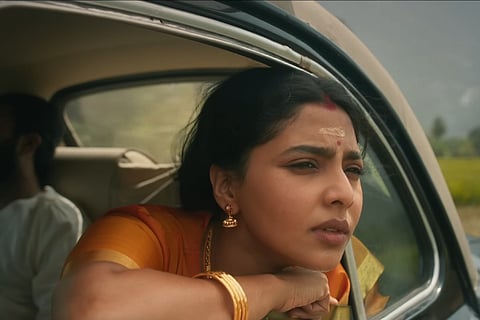

Something diabolical looms in the air of Kanhirangat, a quaint village of an undated time, lying beyond the misty peaks of Illymala. That land is cursed, some caution Kumari (Aishwarya Lekshmi), as she succumbs to her adoptive family’s pressure to get married to the younger son of a feudal family in the faraway village. Eventually, as she begins a new life at her husband’s ancestral home, a sense of foreboding gradually overwhelms the eponymous protagonist. Unbeknownst to her, Kanhirangat has been long awaiting her arrival.
Kumari is only the second directorial venture of filmmaker Nirmal Sahadev. After the Prithviraj Sukumaran-starrer Ranam, which tells the story of a mysterious getaway driver trapped in a life of crime in Detroit, Nirmal now takes us to a rustic world of fantasy, horror and folklore, rooted in an unmapped corner of Kerala. The plots of Kumari and Ranam may seem as different as night and day, but they both essentially tell the same story — a cautionary tale of man’s greed for power, and his inevitable downfall because of it.
The titular Kumari is first introduced to us as a bubbly, ‘Konjum mainakkale’-esque heroine. As the naive young woman who sings and dances along paddy fields, Aishwarya initially comes across as a misfit. It is when she arrives at the tharavadu of her husband Dhruvan (Shine Tom Chacko), and her role takes on a more mature turn, that the actor quickly comes into her own. Soon, Aishwarya composedly nurtures Kumari into a resolute mother who would go to any lengths to save her child, even if that meant climbing a mountain fully pregnant to seek help from a demon god.
The show stealer, however, is Shine as Dhruvan — a tragic character who ends up a victim of his fate and its catastrophic temptations. His transformation from a lonely man craving for affection to a rapacious landlord who craves power over all else is a sight to behold. But the actor's dialogues have little clarity at times, affecting the film's effective communication of plot points. The slurred lines can be justified to some extent if certain plot points are to be considered.
Spadikam George makes a chilling turn as Dhruvan's father, an arrogant and entitled man who gambles with black magic to retain his family's prosperity. National-award winning Surabhi Lakshmi, however, was severely underutilised, almost reduced to theatrics.
The technical merits of Kumari are exceptional across the board. Shot by Abraham Joseph, the ravishing landscapes, and the carefully chosen colour palette together turn the film into a visual spectacle. The meticulous art direction, costume and sound designs evoke a breathless mood that carries Kumari to the final inevitable debacle, which, unfortunately, is where the film disappoints.
While the story, co-written by Fazal Hameed and the director himself, is compelling in large parts, it builds up anticipation to a climax that struggles to live up to the hype. Besides, the fact that the film touches upon the age-old caste atrocities of feudal landlords and the attempts by the oppressed to fight back, but fails to explore any of it in detail, is also dispiriting.
Kumari's many cinematic inspirations are hard to ignore, especially what it seems to have borrowed from Rahi Anil Barve’s excellent Tumbbad (2018) of the same genre. But as far as the horror fantasy genre is concerned, this is a significant leap for Malayalam cinema.
Disclaimer: This review was not paid for or commissioned by anyone associated with the film. Neither TNM nor any of its reviewers have any sort of business relationship with the film's producers or any other members of its cast and crew.